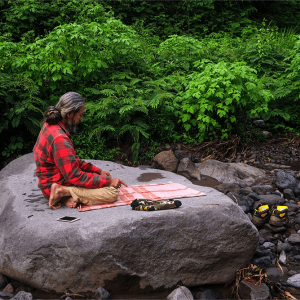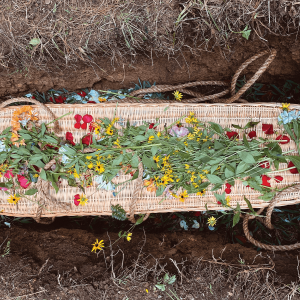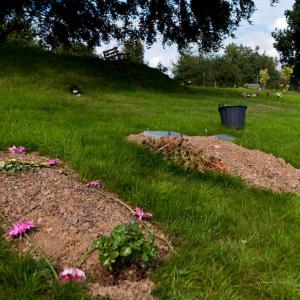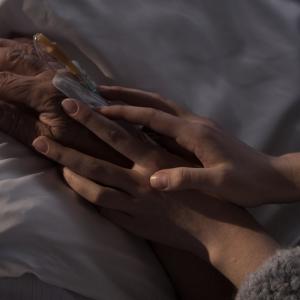
Mallory McDuff is the author of five books, including Love Your Mother: 50 States, 50 Stories, and 50 Women United for Climate Justice and Our Last Best Act: Planning for the End of Our Lives to Protect the People and Places We Love. She teaches environmental education at Warren Wilson College in North Carolina.
Posts By This Author
How Stories From the South Changed My Climate Activism

Adults wearing red t-shirts saying "Mom's Clean Air Force" and children holding signs that says "Kids need you to fight for a healthy climate" and "Fight for clean air" at a press conference where Senate and House Democrats voiced support for the creation of a Civilian Climate Corps, July 20, 2021 - Washington, D.C. Photo credit: Reuters/Michael Brochstein/Sipa USA.
As a mother and teacher, I spent one year researching 50 women — one from each state in the country — who are working toward climate justice. I documented these stories in the book Love Your Mother: 50 States, 50 Stories, and 50 Women United for Climate Justice. What I found in the South were role models on the frontlines of the climate crisis: From the hurricane zone of the Gulf Coast to the urban center of Atlanta, I discovered women who knew how to use their wit, intelligence, faith, and family to fight for their connection to home and the health of those they love.
Are Muslims Leading the Environmental Movement?
It's a question that inspired Saarah Yasmin Latif to create the Green Ramadan Challenge.
When most people consider the holy month of Ramadan, the 30 days of fasting and reflection for Muslims, they may not picture a millennial in a hijab connecting the Qur’an with environmental justice through Instagram hashtags like #greenramadan and #ecomuslim. But Saarah Yasmin Latif is on a mission to help people of all religious traditions connect their faith with individual and collective acts to sustain the earth.
'For Dust Thou Art': The Spiritual Practice of Green Burial
A relationship with God means our bodies and the earth are not separate.
A relationship with God means our bodies and the earth are not separate.
My Family’s Lenten Practices Prepared Us for Green Burial
My father saw Lent as a chance to build a more sustainable life, much like training for a championship game. As a mother and teacher of environmental education in the mountains of North Carolina, I couldn’t have imagined how the Lenten practice of my childhood would help me face both life and death amid a global climate crisis decades later.
The Persistence of Flowers
At the end of the semester, I snipped an iris at its base, the luminous purple petals reminding me of our history as resilient people in diverse places. During my closing online class, I showed the students a vase of flowers, which my daughter and I had arranged on the wrought-iron table on my deck. Maybe I was subconsciously using perennials that return each year as some obvious metaphor for persistence as they peered at me from their childhood homes in California, Texas, South Carolina, and Maine.
Toward a New Conversation on Climate Justice
Maybe it was Rev. William Barber’s preaching that touched me with the moral call to climate justice, in partnership with Al Gore, whose organization Climate Reality Project brought this audience together for a three-day training. Later that night, I realized why the message felt personal: Barber pushed me to reframe my conversations with my daughters about climate justice in this country. I teach environmental education at a small college in North Carolina, but the way I communicated at home around the kitchen table needed a transformation.
My Students Show Me How Climate Action Is Better Than Despair
Juliana was in high school when she first joined Our Children’s Trust to sue the Governor of Oregon for a stable climate. During my environmental education classes, I’ve discussed the litigation to illustrate the importance of a long-term view even for an urgent planetary crisis. When my undergraduates prepare conservation workshops for local schools, they know that Juliana once sat in their places. She hopes to advocate for them in the U.S. District Courthouse in Eugene, Ore. in what may be the lawsuit of their lifetimes. And regardless of this Supreme Court’s decision, youth will gather on the courthouse steps to call for their right to a stable climate.
Staying Vulnerable in the Dark
As she speaks in a voice measured but forceful, Milly challenges us to hold the tension between vulnerability and vigilance in dark times. “We must learn to be vulnerable, she says. “But at the same time, we must be vigilant in the dark.” She reminds us that new life — from a cave or from the womb — comes from the dark and from discomfort, not ease. We must tap into that internal fire, the light that comes from the Holy Spirit.
Joy as Social Change
Radio Free Vermont: A Fable of Resistance, by Bill McKibben. Blue Rider Press.
IT FEELS GOOD to laugh out loud. In the past year I haven’t felt lighthearted about weighty topics such as our political leadership, globalization, and climate change. But Bill McKibben’s latest book, Radio Free Vermont, reminds me that humor can be as powerful as protest in speaking truth to both injustice and abuse of power. Prolific writer, climate organizer, Sojourners columnist, and co-founder of the organization 350.org, McKibben has given his life to galvanizing the climate movement. He advocates for a diversity of strategies, from a carbon tax to public art, with a seriousness reflecting the high stakes of inaction. In his first work of fiction, the satirical plot of Radio Free Vermont revolves around the exploits of Vern Barclay, a 72-year-old radio announcer who finds himself at the center of a campaign to convince Vermonters to secede from the U.S. His motley crew of allies includes Perry Alterson, a teenager with technological expertise who ends every sentence with a question; Trance Harper, a former Olympic biathlon winner; and Sylvia Granger, a firefighter who harbors these fugitives while teaching investment bankers and corporate attorneys how to drive in the mud and fell trees for firewood in their new state. The narrative begins with acts of nonviolent and almost joy-filled resistance by the accidental activists, which include taking over the airwaves at Starbucks with Radio Free Vermont (“underground, underpowered, and underfoot”) and the rather polite hijacking of a Coors Light truck to replace the cargo with Vermont craft beers (which are mentioned by name in nearly every chapter). It’s like the Vermont Welcome Wagon received training in civil disobedience, with a local brew never far from reach.
What ‘The Bright Hour’ Can Teach Us About Living and Dying
This summer, I opened the pages of Nina Riggs’ memoir on living and dying, The Bright Hour, the same day that I walked into a cancer treatment center for the first time in my life. I’d waited for the publication of this book after reading about her embrace of daily life in Greensboro, N.C., as she faced a terminal diagnosis of metastatic breast cancer. During the short period chronicled in the book, the author watches her mother and her best friend Ginny die of cancer: To say that Riggs — and here I just have to call her Nina — has a familiarity with grief is a bit of an understatement.
The Day We Left the Paris Climate Accord
Thus we began the week of healing as the media broadcast Trump’s reality-show drama that cast the climate as some meaningless backdrop for second-rate actors. I passed the time between administering dosages of oxycodone by reading predictions of this staged Rose Garden event. As I read, I wondered: How soon will my daughter heal from this extraction? And what does it mean to extract the second-highest emitter of carbon emissions from an international agreement? And why are these two extractions — on such different scales — linked in my mind forever?
How Do We Tell Time in Hard Times?
How can we learn to mark time, both chronos and kairos, when so many immediate crises seem to manifest as we sleep through each night? I want to learn to hold both types of time, even when I wake up anxious about the world on any given day. And that means I’ll need to practice mercy with myself and others, which isn’t always easy in hard times. At any given point, I can only be in one place in time.
Can I Take a Trump Sabbath for Just One Day?
As a teacher of environmental education, I need to stay informed. But as a mother and writer, I need to stay grounded so I can advocate for justice for my children over the long haul. If my father could give up talking about George W. Bush for 40 days, could I take a Trump Sabbath and fast from the headlines for 24 hours?
Fast for Families: Fasting and Waiting for Immigration Reform in Advent
On the first day of Advent, I began to fast for immigration reform.
I’m not a recent immigrant or a political activist. But I’m a mother, a teacher, and a Christian living in Asheville, N.C., a community affected by our broken immigration system. And I was raised in a faith that tells me that this country should not have an invisible class of people or a justice system that tears apart families. That’s not justice to me.
So Dec. 1-3, I joined the National Days to Act, Fast, and Pray in solidarity with those who have been fasting for three weeks in a tent on the National Mall. Their goal is to urge the House GOP, specifically U.S. House Speaker John Boehner (R-Ohio), to call for a vote on immigration reform.
Why I Cry in Church
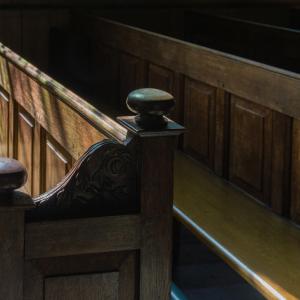
Image via Atosan/Shutterstock
Skeptics might say that as a perimenopausal woman with a teenage daughter, I’m apt to cry at the slightest provocation, which may be true. But I believe something different happens when we expose our vulnerabilities in a community of faith.
A close friend told me her theory that we are being “seasoned” in church each week, preparing to be broken open in ways we cannot anticipate. So we pray the liturgy, sing the hymns, go through the motions. Yet this seasoning of our spirits prepares us to be tender-hearted, open to prayer working on us.
This makes sense to me. There are so few places where we can bring our raw emotions without a self-conscious need to explain or escape to the nearest bathroom, which happens when we get teary-eyed at work or in line at Home Depot. Perhaps church is one of those last safe havens, where we can cry in public for no reason.
Secrets of the Spiritual Paparazzi
Some people follow pop-star celebrities. I follow spiritual writers.
Rather than tracking news about Lady Gaga or Beyonce, I’m a fangirl of writers like Anne Lamott, Nora Gallagher, Kathleen Norris, and Barbara Brown Taylor.
The obsession is borderline embarrassing. Just last month, I announced at a party that writer Nora Gallagher, author of Moonlight Sonata at the Mayo Clinic, friended me on Facebook. (In truth, I was bragging about an imaginary friend.)
After Nora accepted my friend request, I was bold enough to send her the link to an op-ed I had written about making my teenager go to church. Within 48 hours, Nora wrote back that she liked the title of my piece. So I was convinced she would like me too.
My love of spiritual memoirs has reached the point that my book club, The Literary Ladies, issues a collective groan when it’s my turn to suggest book titles. Many believe that memoirs about faith are slightly self-indulgent. In contrast, I view such writing as the deepest expression of sacred meaning in the chaos of our daily lives.
Why I Made My Teenager Go to Church
Making an ultimatum about church attendance to a sleep-deprived teenager may be my own version of hell on earth.
“We are leaving for church in 10 minutes,” I said, summoning my most authoritative voice before the lifeless lump under the covers.
My seven-year old Annie Sky watched the tense exchange between me and my 14-year old daughter Maya, who made periodic moans from the top bunk. With furrowed brow, my first grader sat on the couch, as if observing a tiebreaker at Wimbledon with no clear victor in sight.
For a moment, I wondered why I had drawn the line in the Sabbath sand, announcing earlier in the week that Maya would have to go to church that Sunday morning after an all-day trip to Dollywood with the middle school band. Somehow I didn’t want Dolly Parton’s amusement park to sabotage our family time in church. (The logic seemed rational at the time).
When Maya lifted the covers, I glimpsed the circles under her eyes and sunburn on her skin. But I repeated my command, with an undertone of panic, since I wasn’t sure if I could uphold the ultimatum.
When she finally got into the car, I breathed deeply and turned to our family balm, the tonic of 104.3 FM with its top 40 songs that we sing in unison. As the drama settled, I realized one reason why I made my teenager go to church: I want my daughters to know that we can recover from yelling at each other (which we had) and disagreeing. We can move on, and a quiet, sacred space is a good place to start.
Feeding our Imagination
Fiction with a climate change theme
CRITICS HAVE BEMOANED the lack of fiction centered on climate change, which seems to mirror our public sluggishness about this scientific reality. But two recent novels, Barbara Kingsolver's Flight Behavior (Harper) and Lauren Groff's Arcadia (Voice), artfully integrate climate change into their plotlines, weaving scientific truth about global warming into the lives of fictional characters. Just as compelling, both works of fiction feature spiritual community at the center of critical decisions about the future of the land and its inhabitants.
Flight Behavior is a lyrical story set in rural Tennessee with the fiercely intelligent Dellarobia Turnbow as the main character. She encounters a vast sea of monarch butterflies that seem to have taken a wrong turn on their migratory path, a result of a miracle—or a warming planet. Journalists, ecologists, and locals speculate about the misplaced monarchs. In an impassioned but measured plea for the land, the local pastor invokes a biblical mandate for creation care.
In Arcadia, climate change doesn't enter the narrative until the conclusion of the story, which is the tale of an intentional community started in the 1960s. The central character, Bit Stone, returns to a failed commune in upstate New York, where he grew up, to care for his ailing mother. Set in 2018, the dystopian conclusion is marked by climate change and global pandemics, but the values of the original spiritual community set up a struggle between the desire for freedom and the creation of shared life.
After Giving up Alcohol, I’m Addicted to Lent
This spring, I gave up alcohol for Lent, the forty days of penitence between Ash Wednesday and Easter. And now almost one week after the Alleluias and Easter baskets, I may be addicted to Lent.
On Shrove Tuesday, the day before Lent began, my thirteen-year daughter Maya explained alcohol to her seven-year old sister in the backseat of our car: “See, sometimes adults just like having a drink after a long day of work. It helps them relax.” That same week, one of my friends said, “You aren’t a heavy drinker, but you are a consistent drinker.”
It was time to take a break, even if I knew that one glass of red wine at night wasn’t the end of the world. I needed to give it up because I wasn’t sure if I could.
Why I Return to Bikram Yoga, and the Church
As I waited in the room heated to 105 degrees, my friend Molly looked for a sliver of floor space for her yoga mat. “I probably need a more relaxing type of yoga,” I whispered, almost apologizing for bringing my type-A body to the crowded Bikram class, known for its intense heat and addictive practitioners.
At exactly 10 a.m., the yoga teacher entered the room: I stood in unison with the other students, much like I rise for the procession at my church on Sundays. Surprisingly, much of what draws me to Bikram yoga also brings me back each week to the Episcopal church.
